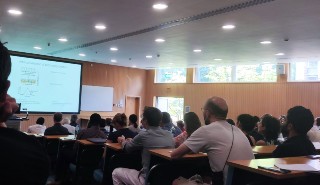Major mathematical modelling conference comes to campus
28 July 2022

Notable scientists using mathematical approaches to answer a wide range of ecological and evolutionary questions were hosted at the University of Reading when it held a high-profile conference last week.
The University was host to the eighth edition of Mathematical Models in Ecology and Evolution (MMEE), one of the largest international conferences that promotes the use of mathematics to tackle problems in the natural world, such as predicting the effects of climate change on marine ecosystems, vegetation, and evolution.
MMEE 2022 brought together more than 200 researchers from across the globe, at all stages of their careers, including PhD and postdoctoral students, to showcase the latest academic developments in mathematical and computational approaches to ecology, evolutionary biology and physical/environmental sciences.
Held from 18-20 July, MMEE 2022 took place at the School of Agriculture, Policy and Development at the University of Reading, Whiteknights Campus.
Inclusive and diverse programme
Dr Shovonlal Roy, an Associate Professor in the Department of Geography and Environmental Science and this year’s Organising Committee lead said: “It was an honour for us to host one of the largest mathematical modelling conferences here at the University of Reading, where we have established research at the forefront of the field. It was one of the largest in-person meetings in Reading post-COVID. We created an inclusive and diverse programme of invited and contributed talks and posters, and particularly encouraged research students and early-career scientists to participate. I am delighted that London Mathematical Society also awarded a grant to further support this initiative.”
The conference programme included 5 keynote talks and 16 minisymposia from various leading scientists, as well as 10 general sessions and a poster showcase and a conference dinner which provided researchers with the opportunity to network.
Reading scientists and PhD students from Departments of Geography and Environmental Science and Biology presented their leading research on vegetation modelling, marine biogeochemical modelling and evolution. Among the plenary speakers was Mark Pagel, Professor of Evolutionary Biology at the University of Reading, who delivered a stimulating talk on phylogenetic trees.
Other plenary speakers included Professor Alan Hastings (University of California, Davis), Dr Silvia De Monte (Max Planck Institute for Evolutionary Biology), Professor Priyanga Amarasekare (University of California, Los Angeles), and Professor Julia Blanchard (University of Tasmania), who delivered timely research on spatial ecology, predicting warming effects on species and climate-change impacts on marine ecosystems.
Exciting new research
Professor Andrew Wade, the Head of Department for Geography and Environmental Science, remarked: “I am delighted that Shovonlal Roy from the Department of Geography and Environmental Science, here at the University of Reading, led the organisation of MMEE 2022, which attracted a large number of international researchers. The conference showcased exciting new research from across the University on ecology and environment science to address big challenges facing the planet resulting from climate change and biodiversity loss.”
More information can be found on the conference website at research.reading.ac.uk/mmee2022.
Follow @UoR_MMEE2022 on Twitter for updates on recordings of the sessions.

